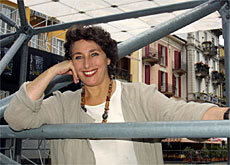
Bignardi focuses on festival line-up

Twenty films will be competing for top awards at Switzerland's biggest film festival in Locarno, due to open next month.
swissinfo spoke to artistic director Irene Bignardi about this year’s line-up and the festival’s place on the international stage.
Productions from 17 countries, including Kazakhstan, Romania, Bolivia and Switzerland are in the running for the festival’s coveted Leopard trophies.
Organisers are also planning to show 18 films on Locarno’s renowned open-air screen in the town square.
swissinfo: The industry is said to be in a state of crisis in terms of financing. How has this affected your work this year?
Irene Bignardi: Maybe I could have found more lavish and rich films but I like the ones I got so much that I do not feel that I have missed anything. I feel sorry for the ones who wanted to make more spectacular films because I am very content with what we have now.
swissinfo: There are a lot of low budget productions, notably the special section from Cuba. Has the festival’s artistic emphasis moved away from the lavish towards low-budget productions?
I.B.: We have a saying in Italian: “Need sharpens your senses.” The fact is that in Cuba they do not have any money, so if you want to do something you have to find new ideas. This film called “Video de Familia”, made with only $400, is a piece of genius. You stay there for an hour watching these five guys from the same family sending a video to their son who has emigrated to the United States. When the lack of money produces these kinds of things we welcome them.
swissinfo: Do you think this will encourage other film-makers who are perhaps feeling disheartened at the moment about the lack of financing?
I.B.: It certainly is, but they have to have the will to find new ways without being discouraged by the lack of money. I think film-makers in countries where there is a lot of money just complain without finding the ways to do something… in Cuba they just have to cope.
swissinfo: You have got quite a few politically charged films, not only from Cuba but also from Kazakhstan or Chechnya. How careful does a festival like Locarno have to be to avoid being accused of taking sides or having a political message?
I.B.: I think that everything in the world is political and giving space to these films is just allowing the world to see the real picture. On top of that I think that we are all very interested and keen in seeing what a country like Chechnya, which has gone through these incredible tragedies, wants to say about itself. It is only a small film but it is very important nevertheless.
I think cinema has always had its “reality” side. But our opening film, “The Band Wagon”, for instance, is a triumph of pure entertainment. We also have art films and we have lovely crazy films like “Calendar Girls”. We appreciate all sides of cinema. The world is speaking through cinema and we have to listen to it.
swissinfo: Music appears to be an influence in many of the films this year at Locarno. You have also got this massive jazz retrospective, which you’ve been planning for quite a long time.
I.B.: It is true that this year we found a lot of music in each film. We have, for instance, a Belgian film on the piazza with a lot of music in it.
Jazz is a form of music which was born among the underdogs of society, among those who couldn’t play in the big orchestras and who consoled themselves for their unhappy lives. Therefore jazz has in a way always been an irregular revolutionary kind of art and so we are very happy to host a retrospective of music and jazz.
swissinfo: Is there a highlight this year that you are particularly looking forward to?
I.B.: I think there are no real highlights but very good quality everywhere. I think the public will have a lot of pleasure, maybe without real highlights but with a great choice.
swissinfo: This year we’ve heard there is less money available. Are you still confident about Locarno’s ability to carve out a niche for itself alongside the big international film festivals?
I.B.: I think that it is certainly true that Locarno is squeezed between Cannes and Venice. It is difficult to find your place if you want to be become another Cannes or Venice.
But if you want to be Locarno and you want to give voice to certain kinds of cinema and have the freedom to do things like have a section on human rights, there is absolutely no problem.
The problem is if you want to be something that you are not.
swissinfo-interview: Vanessa Mock

In compliance with the JTI standards
More: SWI swissinfo.ch certified by the Journalism Trust Initiative

























You can find an overview of ongoing debates with our journalists here . Please join us!
If you want to start a conversation about a topic raised in this article or want to report factual errors, email us at english@swissinfo.ch.